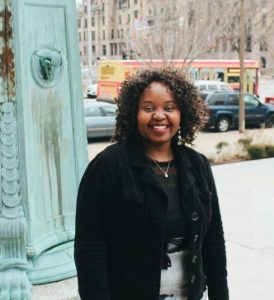Blog
A Promise to Serve – Community Prevention
In 2018, Lutheran Family and Children’s Services (LFCS) is celebrating its 150th anniversary with the theme “Promise.” One-hundred fifty years ago, Rev. Johann Buenger made a promise to help one young boy. Today, more than 46,000 children and families in Missouri receive services each year as our promise continues. To show our continued commitment to those we serve, we wanted to highlight a few people who make it possible for you to receive the support you need. Help us celebrate these shining examples of our mission brought to life.
Joyce Kariuki
Life Skills Facilitator, Mental Health & Community Prevention Services
Q: How long have you worked for LFCS?
A: A little bit over five years.
Q: What services do you provide to our clients?
A: After 12 weeks of group programing, we have the opportunity to work one-on-one with each and every child in a classroom. We have a goal of reaching 105 students annually and we exceed that number every year. We serve kids from 10-years-old up to 18-years-old. Our main focus now is elementary students. We are currently working with over 180 students in 11 classrooms at six schools.
We teach our students about self-esteem, goal setting, advertising, and communication skills, among others. They learn different refusal skills and how to say “no” without being intimidated. We use an evidence based curriculum called “Botvin Life Skills”. It has been proven to work, especially helping students reduce the risk of tobacco, alcohol and drug abuse.
We provide life skills lessons and character education to students in St. Louis schools through the STEP UP Program (Strength, Teach, Empower and Prepare Upwards). We empower kids with psychosocial skills so they can deal with day to day challenges. There is a need for prevention services and huge benefit to teaching life skills. Statistics show that one in every five people will experience mental health issues in their lifetime. If we do not deal with how people feel about themselves, if we do not help children when they are young, then this problem will continue to grow. Prevention helps people enjoy life as it should be and reduces the need for curative measures.
Q: In what way do you feel like you are fulfilling a promise to those you serve?
A: To me, fulfilling our mission means being there for these kids and helping them to know that there is a future for them. This program broaden horizons and provide options that these children were not even aware of because of their circumstance. Once you give children tools to work with, they will have a better future and become better citizens of the society. We give them something greater to aspire to.
To build their self-esteem, we tell them that they are important. We tell them that they are beautiful the way they are. They are enough. They matter. Regardless of who they are or where they are coming from. It does not matter. What matters is how they feel about themselves.
I try to present myself as someone they can look up to. I want them to understand that if they are stressed out they do not need to smoke or use drugs to deal with it. They can talk to someone, take a breather, or go for a walk. There are many ways to deal with one particular issue.
I am from Nairobi, Kenya. If I brought them home with me, they would see people worse off than they are who are really struggling in different ways. I tell my students that I am here because I had a will to succeed. I wanted to travel. I wanted to see what was beyond my boundaries. I realized there was a very big world out there to explore and I had only scratched the surface.
The only way they know how to deal with some of these issues and stress is by fighting back. We help children understand that they have options and there is more than one way to deal with the situations they are facing. I use myself as an example of what is possible for the children that I am working with.
We are fulfilling a promise by giving these children hope. Most of the kids that we are working with are in very challenging environments. Some of these kids do not have love or attention at home. Some of them are from single parent households. Some of them face violent situations. They do not have role models. They often do not care about life and have lost hope.
Q: What is a typical day like for you at LFCS?
A: After the 12 weeks are up, we start one-on-one sessions with each child. My days look very different once this starts because I am hardly ever in the office. I am in the schools working directly with the kids.
It depends on where we are in program. For 12 weeks, I go directly to the schools and carry on my lesson. Afterwards, I check in with the teachers, consolers, or principals. I then go to another school or come back to the office to do paperwork and create reports for each classroom.
Q: What is your favorite part of working at LFCS?
A: I love what I do and working with kids is my calling. Knowing that I impacted someone’s life in a positive way gives me so much joy.
To learn more about LFCS Community Prevention services, click here.